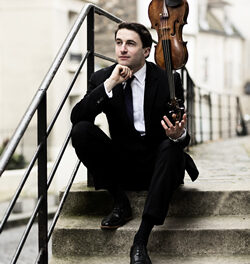“…For never was a story of more woe
Than this of Juliet and her Romeo.”
– William Shakespeare, Romeo and Juliet
With light billowing from above – ethereal and majestic – juxtaposed with the bleakness of sorrow below, Romeo and Juliet climb the stairs from the Capulet crypt, leaving behind a cast of players whose hands are bloodied in the tragedy of their love. It is now, only in death and spirit, that their union is unobstructed. With linked hands, their ascension into the light finally signifies peace and the couple’s eternity together. UNC School of the Arts’ production of Romeo & Juliet, directed by School of Drama Dean Carl Forsman, is lush and passionately romantic.
It is the familiar tale of two star-crossed lovers of enemy families as they face tiresome opposition and violence in the name of their passion. Yet in the end, tragedy strikes, and a heavy price must be paid for an abundance of hatred.
Often in the execution of Romeo and Juliet, as the text laments with decadence and the subject matter pertains to tragedies of the heart, there is the precarious struggle of preventing the heightened emotional circumstances from reading as simply antsy melodrama. Although Forsman’s production beautifully captured the combustion of requited love, which anchors the play, there were indeed moments that whined with pubescent ardor and strained to manipulate the audience’s reception. The brilliance of Shakespeare’s verse is that it alone carries the gravitas of joy and sorrow, aiding the actors tremendously in the conveyance of sincerity without the lure of instructing audiences of what should be felt and when.
However, with very few said exceptions, the cast was more than triumphant in honoring and revitalizing one of literature’s most beloved stories. Gus Halper, as young Romeo, was gallant and charming. Often the role, in less than astute hands, can be limited to immature flippantness, however Halper was able to add depth and subtle psychology, which grounded and layered his performance. The character of Juliet on the other hand, played by Noelle Franco, experiences more of an emotional evolution than any other character in the play. She most possesses a girlish naiveté that blossoms into womanhood over the course of the play’s happenings as she navigates the most personal of relationships. Franco, unquestionably a beautiful and intelligent actress, excelled at depicting Juliet’s determination. However, it was to the same resolve that her characterization lacked a desired delicateness to reinforce her very sheltered adolescence. Without such an approach, the very sensible and heady Juliet appeared emotionally monotonous and less complex.
Although the entirety of the supporting cast was strong, there were a couple of substantial standouts. Max Stampa-Brown delivered a stellar performance as Romeo’s dear friend Mercutio. His very physical and vocally varied delivery, specifically in the Act I, Scene iv “Queen Mab” speech, solidified his captivating presence throughout. Ellie Barone was spectacular as Juliet’s nurse. Barone had such a powerful presence on the stage that it was difficult not to be completely transfixed by the enormity of her talent. She was able to couple smart acting choices with a flare for comedic timing, which resulted in moments that truly stole the show.
Jonathan Dahm Robertson’s set of simplistic geometric spaces, almost stone-like, painted a slate gray and scribed with Latin text was gorgeous, and the perfect neutral backdrop for the play. With opening and closing squares for doors and balconies, the set lent itself effortlessly to the production, whose emphasis was less on setting and more on the universal story. Costume designer Colleen Hall adorned the cast with very sleek 19th century garb, which reinforced sophistication. The women were dressed with effeminate Empire silhouetted gowns, with flowing fabrics cinched under the bust line. The men had waistcoats, trousers, high calf boots, and delicate cravats.
As a whole, the production was successfully moving, resounding in the heart of even the most cynical of theatergoers, a feat to be celebrated, as there is no greater love story than Romeo and Juliet.
Romeo and Juliet continues through Sunday, March 30. For more details on this production, please view the sidebar.











